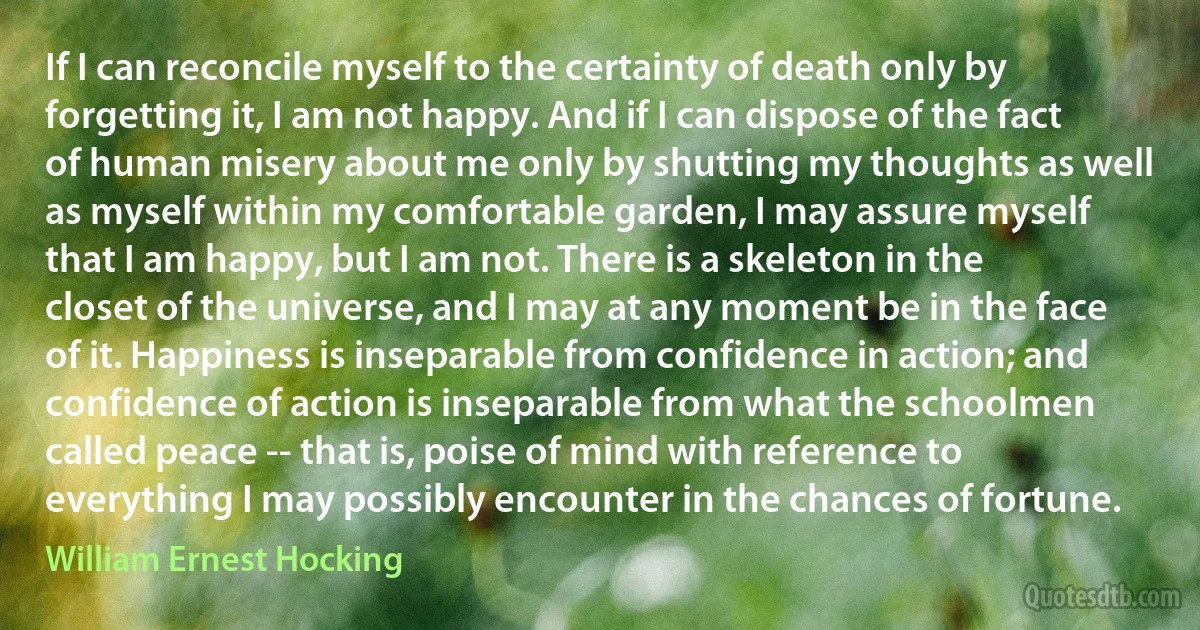Reference Quotes - page 18
Einstein's space is no closer to reality than Van Gogh's sky . The glory of science is not in a truth more absolute than the truth of Bach or Tolstoy, but in the act of creation itself. The scientist's discoveries impose his own order on chaos, as the composer or painter imposes his; an order that always refers to limited aspects of reality, and is based on the observer's frame of reference, which differs from period to period as a Rembrant nude differs from a nude by Manet.

Arthur Koestler
On July 4 1983, I met with officials of the Committee for the Reform of the Written Language in Peking. They informed me that they were working on another revision of their word list and that they would consider making an alphabetized dictionary based on it. Their eyes lit up when I told them I would gladly pay a small fortune for such a reference tool. An alphabetically ordered dictionary would certainly be worth such a sum because of the huge amount of time it would save in my research. Naturally, I hope that the Chinese will be able to produce this type of dictionary at a cost that will make it widely available.

Victor H. Mair
We should work toward a universal linked information system, in which generality and portability are more important than fancy graphics techniques and complex extra facilities. The aim would be to allow a place to be found for any information or reference which one felt was important, and a way of finding it afterwards.

Tim Berners-Lee
Enlightenment can't be pursued or sought after. [...] Truth is here now; no past, no future. People are unenlightened only because they believe in the truth of the past and therefore must look to the rewards of the future. To be enlightened, to return to the original state of life on earth, requires action now in the present with no reference to the past. What has to be done is to kill the old priest in you, starve out the traditionalist, the follower, the believer.

Barry Long
About 70 years ago, only a small number of "elementary particles”, thought to be the basic building blocks of matter, were known: the proton, the electron, and the photon as the quantum of radiation. All these particles are stable (the neutron is stable only in nuclear matter, the free neutron decays by beta decay: n→p+e−+\overline{\nu}). Owing to the availability of large accelerators, this picture of a few elementary particles has profoundly changed: today, the standard reference Review of Particle Properties lists more than 100 particles. The number is still growing as the energies and luminosities of accelerators are increased.

Walter Greiner
"The Padayottam military occupation period won't be forgotten by the Malayalis for generations. It was this invasion, between Malayalam era 957 to 967 (1782 to 1792) that turned Malayalam upside down," says P. Raman Menon, biographer of Shaktan Tampuran, the King of Cochin during Tipu's invasion. He adds: "There was hardly any cowshed left in Malayalam where the Mysore Tiger did not enter." The reference is to the mass cow-slaughter carried out by Tipu's army on his orders.

Tipu Sultan
The term eunuchs was used by Eldridge Cleaver to describe blacks. It occurred to me that women were in a somewhat similar position. Blacks had been emancipated from slavery but never given any kind of meaningful freedom, while women were given the vote but denied sexual freedom. In the final analysis, women aren't really free until their libidos are recognized as separate entities. Some of the suffragettes understood this. They could see the connection among the vote, political power, independence and being able to express their sexuality according to their own experience, instead of in reference to a demand by somebody else. But they were regarded as crazy and were virtually crucified. Thinking about them, I suddenly realized, Christ, we've been castrated and that's what it's all about. You see, it's all very well to let a bullock out into the field when you've already cut his balls off, because you know he's not going to do anything. That's exactly what happened to women.

Germaine Greer
Instead of understanding and following the teachings of Jesus, the Christians argued and quarreled about the nature of Jesus's divinity and about the Trinity. They called each other heretics and persecuted each other and cut each other's heads off. There was a great and violent controversy at one time among different Christian sects over a certain diphthong. One party said that the word Homo-ousion should be used in a prayer; the other wanted Homoi-ousion-this difference had reference to the divinity of Jesus. Over this diphthong fierce war was raged and large numbers of people were slaughtered.

Jawaharlal Nehru
On Global Warming, in response to Massachusetts Assistant Attorney General James Milkey's correction of Scalia's reference to the stratosphere: Troposphere, whatever. I told you before I'm not a scientist. That's why I don't want to have to deal with global warming, to tell you the truth.

Antonin Scalia
Even laws enacted for broad and ambitious purposes often can be explained by reference to legitimate public policies which justify the incidental disadvantages they impose on certain persons. Amendment 2, however, in making a general announcement that gays and lesbians shall not have any particular protections from the law, inflicts on them immediate, continuing, and real injuries that outrun and belie any legitimate justifications that may be claimed for it. We conclude that, in addition to the far-reaching deficiencies of Amendment 2 that we have noted, the principles it offends, in another sense, are conventional and venerable; a law must bear a rational relationship to a legitimate governmental purpose, Kadrmas v. Dickinson Public Schools, 487 U. S. 450, 462 (1988), and Amendment 2 does not.

Anthony Kennedy
It is strange that people should take so much interest at one time in what they so soon forget; - the truth is, they feel no interest in it [news of the day] at any time, but it does for something to talk about. Their ideas are served up to them, like their bill of fare, for the day; and the whole creation, history, war, politics, morals, poetry, metaphysics, is to them like a file of antedated newspapers, of no use, not even for reference, except the one which lies on the table! You cannot take any of these persons at a greater disadvantage than before they are provided with their cue for the day. They ask with a face of dreary vacuity, 'Have you anything new?' - and on receiving an answer in the negative, have nothing further to say.

William Hazlitt
What I write is full of infirmities. I have been in solitary confinement for twelve months and in a death cell for three months, deprived of all facilities. I have written much of this by resting the paper on my thigh in unbearable heat. I have no reference material or library, I have rarely seen the blue sky. The quotations are from the few books I was permitted to read and from the journals and newspapers you and your mother bring once a week during your visits to my suffocating cell. I am not making excuses for my deficiencies but it is very difficult to rely on a fading memory in such physical and mental conditions.
I am fifty years old and you are exactly half my age. By the time you reach my age, you must accomplish twice as much as I have achieved for the people.

Zulfikar Ali Bhutto
The transfer of the allegiance and citizenship, of no small part of the heart and life, of human beings from one sovereignty to another, without any reference to their own consent, has been a great reproach to some former transactions in Europe; has led to many wars and disturbances; is hard to reconcile with considerations of equity; and is repulsive to the sense of modern civilization.

William Ewart Gladstone
...But as far as the novel makes reference to that, Miguel seems to be willing to concede to the mother's care more than enforce macho authority over the sickly boy. Miguel is a man of the new millennia. He listens to what his significant other opines. As an educated individual, he also turns to literature for answers. He reflects on his failed marriage and tries to learn from it rather than shut down and repeat his mistakes. There is a deep desire to find spiritual and romantic fulfillment. He's willing to find new ways to do that within the constrictions of society's patriarchal institutions.

Ana Castillo
You really have to put things in their context and their historic moment. For me, my idol was always Johan Cruyff. For me he has always been the greatest, not just as a player but also as a person. (...) He has been a point of reference for me. It was his era, his moment - and he was the best in the world. For me, the best in history.

Johan Cruyff
Historically, the claim of consensus has been the first refuge of scoundrels; it is a way to avoid debate by claiming that the matter is already settled. Whenever you hear the consensus of scientists agrees on something or other, reach for your wallet, because you're being had.
Let's be clear: the work of science has nothing whatever to do with consensus. Consensus is the business of politics. Science, on the contrary, requires only one investigator who happens to be right, which means that he or she has results that are verifiable by reference to the real world. In science consensus is irrelevant. What is relevant is reproducible results. The greatest scientists in history are great precisely because they broke with the consensus. There is no such thing as consensus science. If it's consensus, it isn't science. If it's science, it isn't consensus. Period.

Michael Crichton


![[T]he Labour Party stands for a contributory scheme so far as this Bill is concerned. Moreover, we are in favour of a contributory scheme with reference to sickness, whilst we were in favour of a non-contributory scheme in reference to old age pensions. (Ramsay MacDonald)](https://cdn.quotesdtb.com/img/quotes_images_webp/12/ramsay-macdonald-age-bill-1010412.webp)
